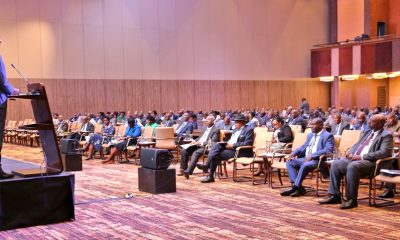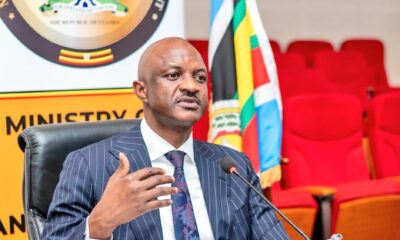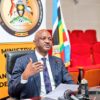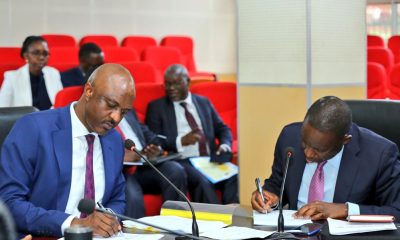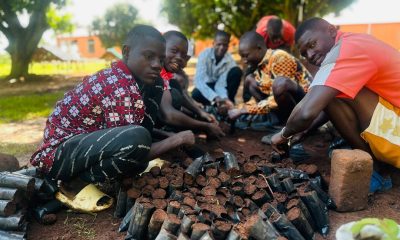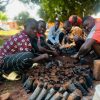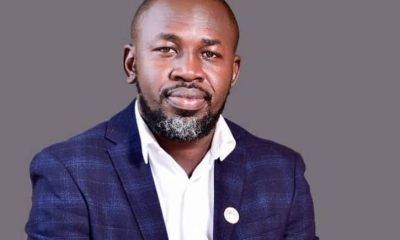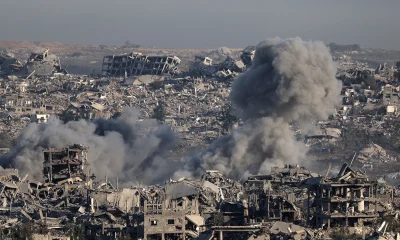Opinions
Why do Ugandans think ‘life is short’?
Government seems to have no answers; leaders prefer calling for national prayers to addressing the various adversities affecting people.

DOOMED: Acholi leaders led a protest against the government plan to give land to investors. Their fight shows a loss of trust in government that has infected majority of Ugandans
Last week, I disappointed a few people. For the first time I went against one of the principles of this column. “Why does Uganda have more churches than factories?” the headline screamed, but it remained just that – a headline! It was on purpose. This week I start a min-series of explaining the purpose.
Like many other countries where government policy is killing more jobs than it is creating, Uganda is becoming a troubled society. From child sacrifices to unexplained murders (of police chiefs, religious leaders and women), abject poverty particularly in rural areas, rampant unemployment, incurable diseases (cancer, HIV/AIDS, nodding disease), increased crime rate (violent robberies) and accidents, the level of the breakdown of Ugandan society is getting scary even to bravest souls.
Recent collapse of the economy has worsened the prevalence rate of these typical features of poor society. As people keep waiting for answers, they seem not to get convincing ones. Government, for example, is attributing recent murders of over 20 young women to witchcraft (a.k.a. illuminati)! Imagine!! Senior policymakers are blaming young graduates that cannot find work of having studied the ‘wrong courses’. The ‘rich’ are chocking on bank loans priced at over 20% per annum.
Desperate people living hopeless lives tend to resort to God. Researchers have for years found a positive relationship between hopelessness and religious problem-solving skills. Since its creation, religion has had enormous potential for addressing social problems.
Emile Durkheim, the celebrated French sociologist, explained centuries ago that religion was created to answer unanswerable questions. That’s why as countries advance and well-being of people improves, the level of religious faith declines.
In Scandinavian countries (Sweden, Norway, Denmark, the Netherlands etc) hardly a quarter of their populations believe that God exist. Even those few who believe do not go to church; churches are being turned into supermarkets and bars.
A recent survey of the most religious countries in the World is telling: Ethiopia is topping the group with over 98% of its population considering religion as the most important thing. It is closely followed by Senegal (97%), Indonesia (95%) and Uganda (also 95%). So, only 5% of Ugandans consider other things such as science and innovations or decent work as most important.
People care more about the afterlife!
Interestingly, people in all developed and equal countries consider other things (than religion) as the most important. Only 11% of the Japanese think religion is the most important thing. Even in France, where the Pope resides, only 14% of the population considers religion as the most important thing. The trend is very clear; poor countries are more religious than rich ones.
Uganda has always been a religious country. Our national motto is “For God and My Country.” Our national anthem starts by calling upon God to uphold thee. So Ugandans are born religious, grow up in religion and die in religion. Being religion is a good thing.
Research shows that aspects of religion can complement or even motivate development. Religion complements other aspects of human prosperity such as knowledge, health, safety, decent work and leisure, self-esteem, and culture. Religious people and institutions may also be agents of advocacy, empowerment, social movement and service delivery.
However, researchers have found that under particular circumstances religion can also undermine or even obstruct development. Religious people and institutions can suffocate advocacy (by telling people to care more about the afterlife), oppose empowerment (e.g. of women), or even can tie up capital by compelling the poor to build more worship temples instead of productive units.
In Uganda, for example, the most beautiful and largest structure in every village is a church or mosque, built using money fundraised by the locals and their politicians. This is what prompted me to ask the question: why does Uganda have more churches than factories?
Amartya Sen, one of the few living economic philosophers, explains that instead of grumbling, many of the extreme poor have reconciled themselves with their lot and seem ‘grateful for small mercies’. He notes, however, that the happiness of poor religious people is an indicator of their poor quality of life in other aspects.
Voices of the Ugandan poor
In 2000, the World Bank conducted a global survey where they interviewed over 60,000 poor people in 47 countries –Uganda inclusive – in what they termed the “Voices of the Poor”. As one of the findings of the survey, the poor noted that harmony with the divine matters (spiritual life and religious observance) was part of their well-being.
They often, in several countries, mentioned turning to God for comfort, solace, and support. A poor man in Pakistan said, “As God gives food to a tiny insect living in the stones, He makes sure we have enough food to live.”
When I was a student, I read what the poor in Uganda told the World Bank and left me amazed. I revisited this study and extracted a few of these voices of the poor from Uganda. I thought they might help answer a few questions that we keep asking ourselves.
A poor elderly man in Uganda told World Bank, “The forces of poverty and impoverishment are so powerful today. Governments or the big churches can only manage them. So we now feel somewhat helpless. It is this feeling of helplessness that is so painful, more painful than poverty itself.”
Another one said, “I inherited the poverty. I was born to a poor father, who could not educate me and could not give me any land. I managed to get very little land of poor quality; it is so likely my children will be poorer.” His regret of having a poor father who could not take him to school is supported by another poor Ugandan who told the World Bank, “The future lies in the education of our children.”
“If I had gone to school, I would have got a job and I would have obtained a husband who has a salaried job,” another poor Ugandan confirmed the significance of education.
Yet another person reported something that underscores the irrelevance of education in the lives of many poor people in Uganda. He said, “Getting a job has nothing to do with what you learn in school. School was a waste of time.”
“Polygamy is killing us”
Gender issues also came out. One poor woman reported, “Even if a woman is given a chicken or a goat by her parents, she cannot own it. It belongs to her husband. A wife may work hard and get a chicken. If it lays eggs, they belong to the husband.”
Another said, “In our country, women plan the income and men plan the expenditure.” A Woman in Kabarole added, “Whether a woman wants it or not, the man must control the money, and if she refuses she is in danger of being ‘retrenched’ (sent away from home).”
Then the World Bank asked a group of poor women in Arua, “What kind of work do men in your area do?” They responded in chorus, “Eat and sleep then wake up and go drinking again.” One of them said, “I wish I had been born a man.”
A woman in Iganga said, “Polygamy is killing us; my husband with two acres of land has five wives. Our so many children share the little land and they all suffer.”
An older poor man in Kagadi summarised my own mind, “Poverty has always been with us in our communities…, and it affected many—perhaps all of us. But it was a different type of poverty. People were not helpless. They acted together and never allowed it to ‘squeeze’ any member of the community. They shared a lot of things together: hunting, grazing animals, harvesting, etc. There was enough for basic survival. But now things have changed. Each person is on their own.
A few people who have acquired material wealth are very scared of sliding back into poverty. They do not want to look like us. So they acquire more land, marry more wives, and take all the young men to work for them on their farms and factories. So we are left to fight this poverty ourselves. And yet we only understand a little of it. It is only its effects that we can see. The causes we cannot grasp.”
Another poor man innocently summarised the extent of corruption in our country, “In Jinja hospital, you first pay Shs 500 for the book to have your name recorded, then you pay another Shs 500 for the doctor’s consultation. In case you are referred to a Chinese doctor, you pay another Shs 1000. In this case you also have to pay ‘foot allowance’ to the person who takes you to the Chinese doctor. This one is negotiable. Should you be admitted, then you begin paying Shs 500 per day. And if you make a mistake of mentioning that you are from Masese, you will simply not be treated at all — we are so poor.”
Yet not even death would make someone from Masese or elsewhere in Uganda rest in peace, “Even before the funeral of the deceased husband, some widows are mistreated by the in-laws who take all the property, including the children,” said a group of women in Mbarara.
With these accounts from Ugandans, how can one fail to understand why they resorted to God? Especially when government has gone AWOL! In such circumstances only God can attend to adversities that inflict pain and hopelessness to people.
Some of them may look healthy, well dressed, and better educated; the truth of the matter remains: many Ugandans think life is short because they grow up in poverty, live in hardship, witness loads of their friends, close relatives and other associated die like rats (from murder, accidents, simple and incurable diseases alike). And government seems to have no answers to them; our leaders prefer calling for national prayers to addressing these adversities.
Comments



